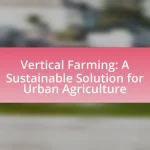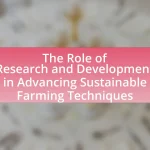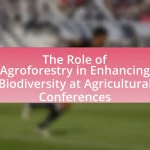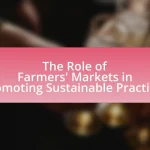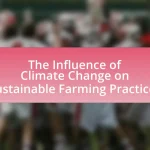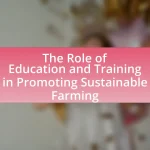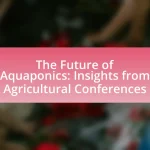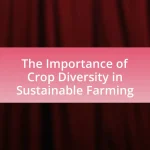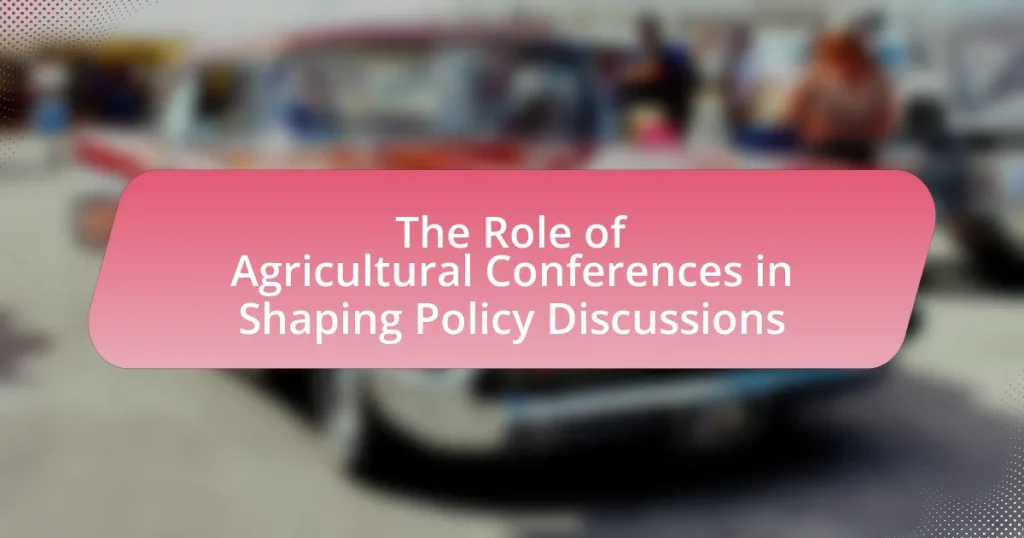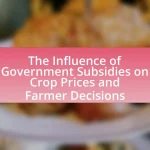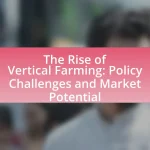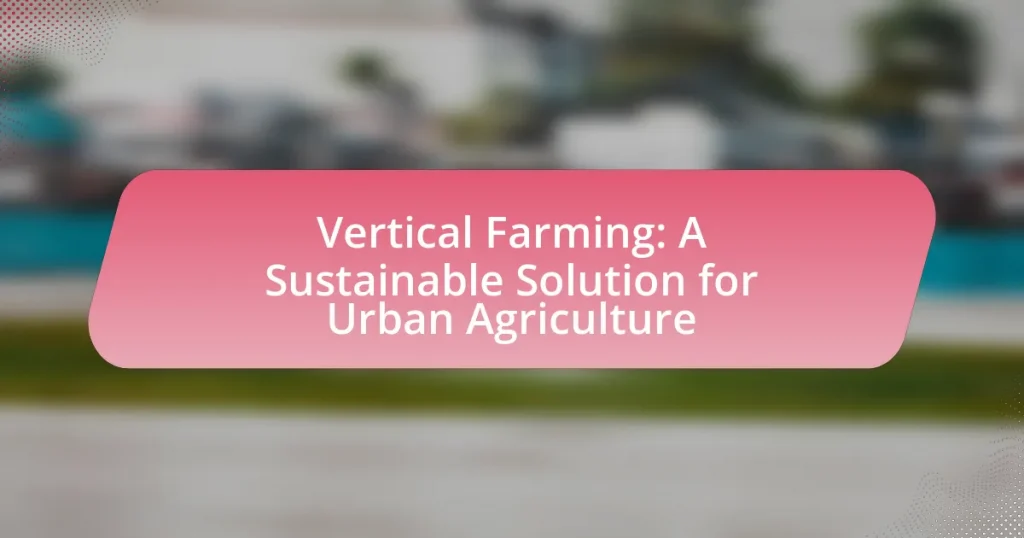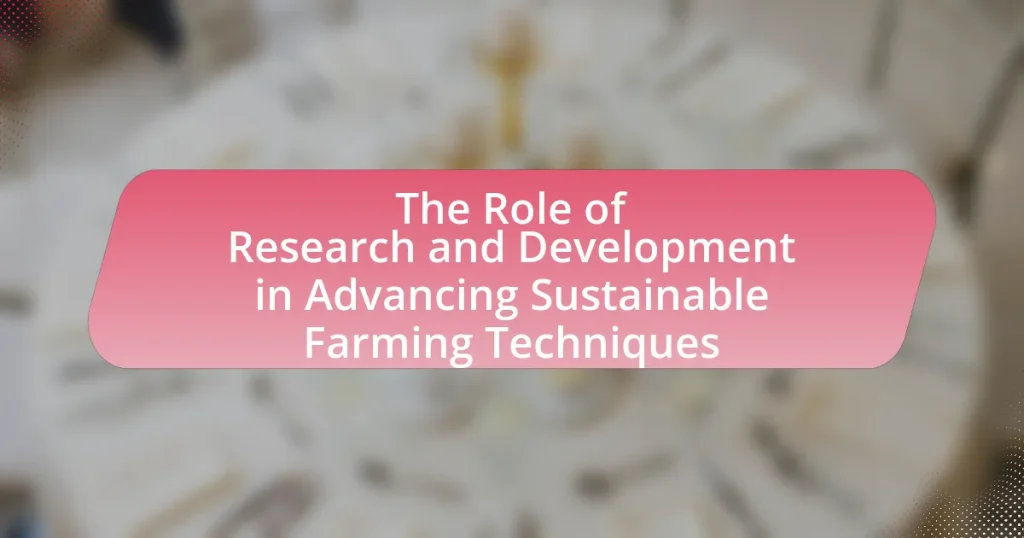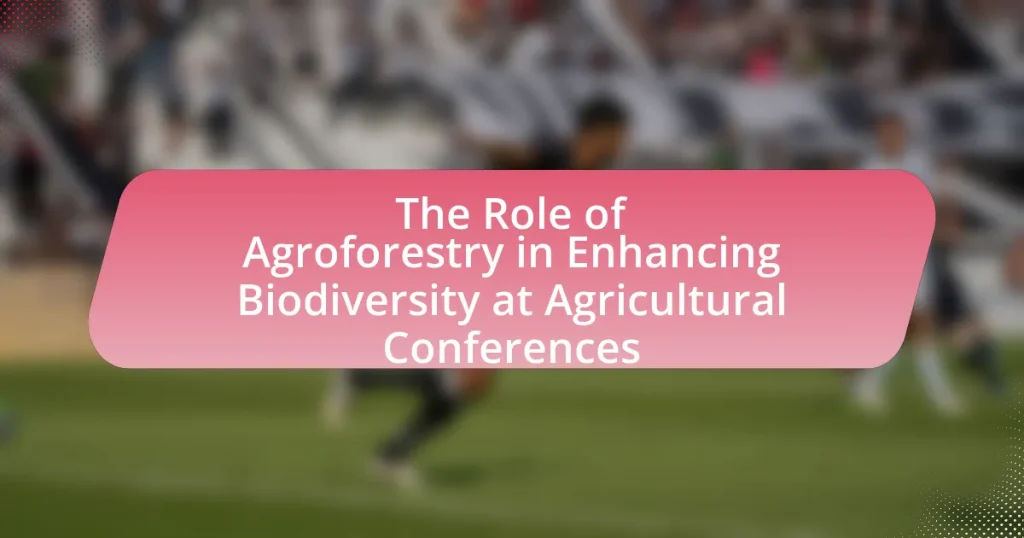Agricultural conferences serve as vital platforms for shaping policy discussions by facilitating knowledge exchange among key stakeholders, including policymakers, researchers, and industry leaders. These events address critical agricultural issues such as food security, sustainability, and technological advancements, leading to actionable policy recommendations. The article explores the influence of agricultural conferences on policy-making processes, the diverse stakeholders involved, and the various types of conferences that exist. It also examines the challenges faced in achieving consensus and the impact of logistics and funding on conference effectiveness. Additionally, the article highlights future trends and emerging topics that are likely to shape policy discussions in agriculture.
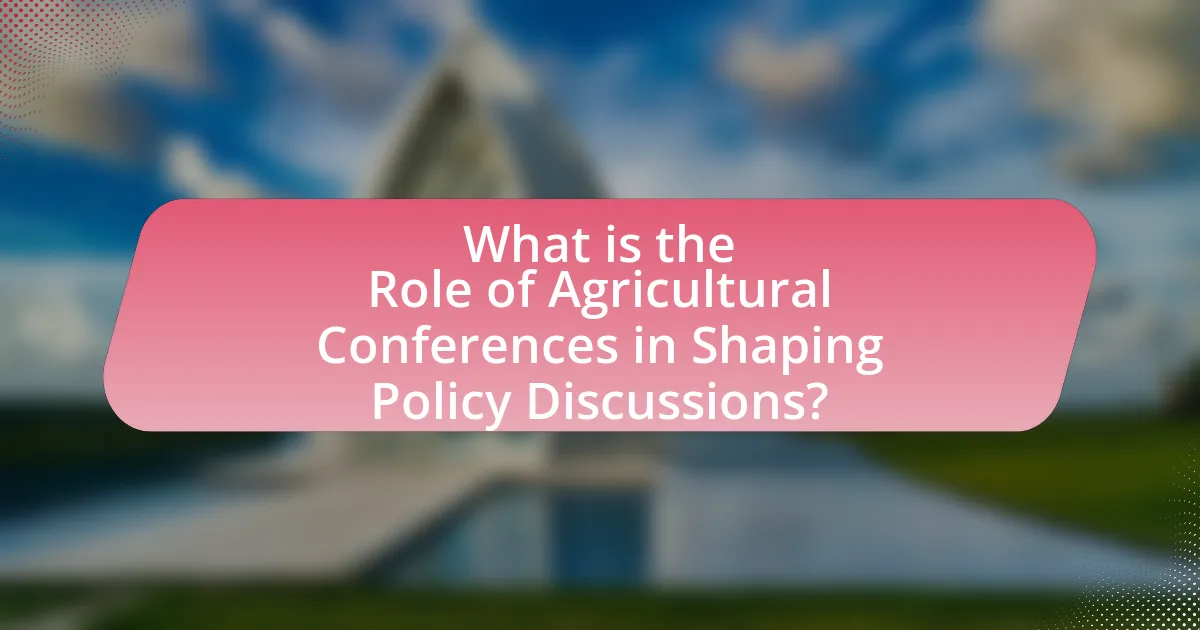
What is the Role of Agricultural Conferences in Shaping Policy Discussions?
Agricultural conferences play a crucial role in shaping policy discussions by providing a platform for stakeholders, including policymakers, researchers, and industry leaders, to exchange knowledge and ideas. These conferences facilitate dialogue on pressing agricultural issues, such as food security, sustainability, and technological advancements, which directly influence policy formulation. For instance, the Global Forum for Food and Agriculture gathers international experts to discuss agricultural policies, leading to actionable recommendations that governments can adopt. This collaborative environment fosters consensus-building and helps align diverse interests, ultimately guiding effective agricultural policies.
How do agricultural conferences influence policy-making processes?
Agricultural conferences influence policy-making processes by facilitating dialogue among stakeholders, including policymakers, researchers, and practitioners. These events provide a platform for sharing research findings, best practices, and innovative solutions, which can directly inform policy decisions. For instance, the Food and Agriculture Organization (FAO) reports that conferences like the Global Forum for Food and Agriculture have led to the adoption of policies aimed at improving food security and sustainable agricultural practices. By fostering collaboration and disseminating critical information, agricultural conferences play a crucial role in shaping effective agricultural policies.
What key stakeholders participate in these conferences?
Key stakeholders participating in agricultural conferences include government officials, policymakers, industry leaders, researchers, and representatives from non-governmental organizations (NGOs). These stakeholders engage in discussions that shape agricultural policies and practices, ensuring that diverse perspectives are considered. For instance, government officials provide regulatory insights, while industry leaders share market trends and innovations, contributing to a comprehensive dialogue on agricultural development.
How do discussions at these conferences translate into policy changes?
Discussions at agricultural conferences translate into policy changes through the exchange of knowledge, networking, and the formulation of actionable recommendations. These conferences bring together policymakers, researchers, and industry stakeholders, facilitating dialogue that highlights pressing agricultural issues and innovative solutions. For instance, the 2019 Global Forum for Food and Agriculture led to the adoption of the “Berlin Declaration,” which influenced EU agricultural policy by emphasizing sustainability and food security. Such outcomes demonstrate how collaborative discussions can directly inform and shape legislative frameworks and policy initiatives in agriculture.
Why are agricultural conferences important for policy discussions?
Agricultural conferences are important for policy discussions because they serve as platforms for stakeholders to exchange knowledge, share best practices, and influence agricultural policy. These conferences bring together farmers, researchers, policymakers, and industry leaders, facilitating dialogue that can lead to informed decision-making. For instance, the Food and Agriculture Organization (FAO) emphasizes that such gatherings can enhance collaboration and innovation, ultimately shaping policies that address food security and sustainability challenges. By fostering these interactions, agricultural conferences play a crucial role in aligning diverse interests and promoting effective agricultural policies.
What unique perspectives do these conferences provide?
Agricultural conferences provide unique perspectives by facilitating dialogue among diverse stakeholders, including policymakers, researchers, and farmers. These gatherings enable the exchange of innovative ideas and best practices, which can lead to informed policy decisions. For instance, conferences often showcase cutting-edge research and technological advancements that address current agricultural challenges, such as climate change and food security. Additionally, they offer a platform for grassroots voices, ensuring that the experiences and needs of local farmers are considered in policy discussions. This multifaceted approach enhances the relevance and effectiveness of agricultural policies, ultimately contributing to sustainable development in the sector.
How do agricultural conferences foster collaboration among stakeholders?
Agricultural conferences foster collaboration among stakeholders by providing a platform for networking, knowledge sharing, and joint problem-solving. These events bring together farmers, researchers, policymakers, and industry representatives, facilitating discussions that lead to collaborative initiatives. For instance, the International Conference on Agriculture and Horticulture has demonstrated that such gatherings can result in partnerships that address common challenges, such as climate change and food security. By promoting dialogue and the exchange of best practices, agricultural conferences enhance stakeholder engagement and drive collective action towards sustainable agricultural development.

What types of agricultural conferences exist?
Various types of agricultural conferences exist, including research conferences, industry trade shows, policy forums, and educational workshops. Research conferences focus on presenting scientific findings and innovations in agriculture, while industry trade shows showcase products and services relevant to agricultural professionals. Policy forums facilitate discussions among stakeholders about agricultural policies and regulations, and educational workshops provide training and resources for farmers and agricultural workers. Each type of conference plays a crucial role in advancing knowledge, networking, and influencing agricultural policy discussions.
How do different types of conferences address policy issues?
Different types of conferences address policy issues by providing platforms for stakeholders to discuss, debate, and formulate strategies related to specific topics. Agricultural conferences, for instance, often bring together farmers, policymakers, researchers, and industry leaders to address pressing agricultural challenges, such as food security and sustainable practices. These conferences facilitate knowledge exchange through presentations, workshops, and panel discussions, allowing participants to share best practices and innovative solutions.
For example, the International Conference on Agriculture and Horticulture gathers experts to discuss agricultural policies and their implications on global food systems, highlighting the importance of collaborative efforts in policy formulation. Additionally, conferences often result in policy recommendations that can influence legislative agendas, as seen in the outcomes of the World Agricultural Forum, which has led to significant policy shifts in various countries.
What are the main themes covered in agricultural policy conferences?
The main themes covered in agricultural policy conferences include sustainability, food security, climate change adaptation, agricultural innovation, and rural development. These themes are critical as they address the challenges and opportunities facing the agricultural sector. For instance, sustainability focuses on practices that ensure long-term agricultural productivity while minimizing environmental impact. Food security discussions emphasize the need to ensure access to sufficient, safe, and nutritious food for all. Climate change adaptation is increasingly relevant, as agricultural policies must evolve to mitigate the effects of climate variability. Agricultural innovation highlights the role of technology and research in improving productivity and efficiency. Lastly, rural development themes address the socio-economic aspects of agriculture, aiming to enhance the livelihoods of rural communities.
How do regional conferences differ from international ones?
Regional conferences focus on specific geographic areas and address localized agricultural issues, while international conferences encompass a broader range of topics affecting multiple countries and global agricultural policies. Regional conferences often feature participants from nearby regions, facilitating discussions that are directly relevant to local practices and challenges, such as crop management specific to a climate zone. In contrast, international conferences bring together a diverse array of stakeholders, including policymakers, researchers, and industry leaders from various countries, allowing for the exchange of global best practices and the development of international agreements. This distinction is evident in events like the Regional Conference on Food Security in Africa, which targets issues specific to African nations, versus the Global Forum on Food Security and Nutrition, which addresses worldwide food security challenges.
What role do workshops and panels play in these conferences?
Workshops and panels serve as critical platforms for knowledge exchange and collaborative dialogue in agricultural conferences. They facilitate discussions among experts, policymakers, and stakeholders, allowing for the sharing of best practices, innovative solutions, and emerging research relevant to agricultural policy. For instance, workshops often provide hands-on training and practical insights, while panels enable diverse perspectives on pressing issues, fostering a comprehensive understanding of challenges and opportunities in the agricultural sector. This interactive format enhances participant engagement and encourages networking, ultimately contributing to informed decision-making and policy development in agriculture.
How do interactive sessions enhance policy discussions?
Interactive sessions enhance policy discussions by fostering active engagement among participants, which leads to diverse perspectives and collaborative problem-solving. These sessions encourage open dialogue, allowing stakeholders to share insights and experiences that can inform policy decisions. Research indicates that interactive formats, such as workshops and roundtables, increase participant satisfaction and retention of information, ultimately resulting in more effective policy outcomes. For instance, a study by the International Food Policy Research Institute found that interactive discussions at agricultural conferences significantly improved stakeholder collaboration and policy alignment.
What outcomes are typically expected from these workshops?
Workshops at agricultural conferences typically result in enhanced knowledge sharing, improved networking opportunities, and actionable policy recommendations. Participants gain insights into best practices and innovative solutions relevant to current agricultural challenges, which can lead to the development of more effective policies. For instance, a study by the Food and Agriculture Organization highlights that workshops facilitate collaboration among stakeholders, fostering a collective approach to policy formulation. This collaborative environment often results in the identification of key issues and the establishment of strategic priorities that influence agricultural policy discussions.
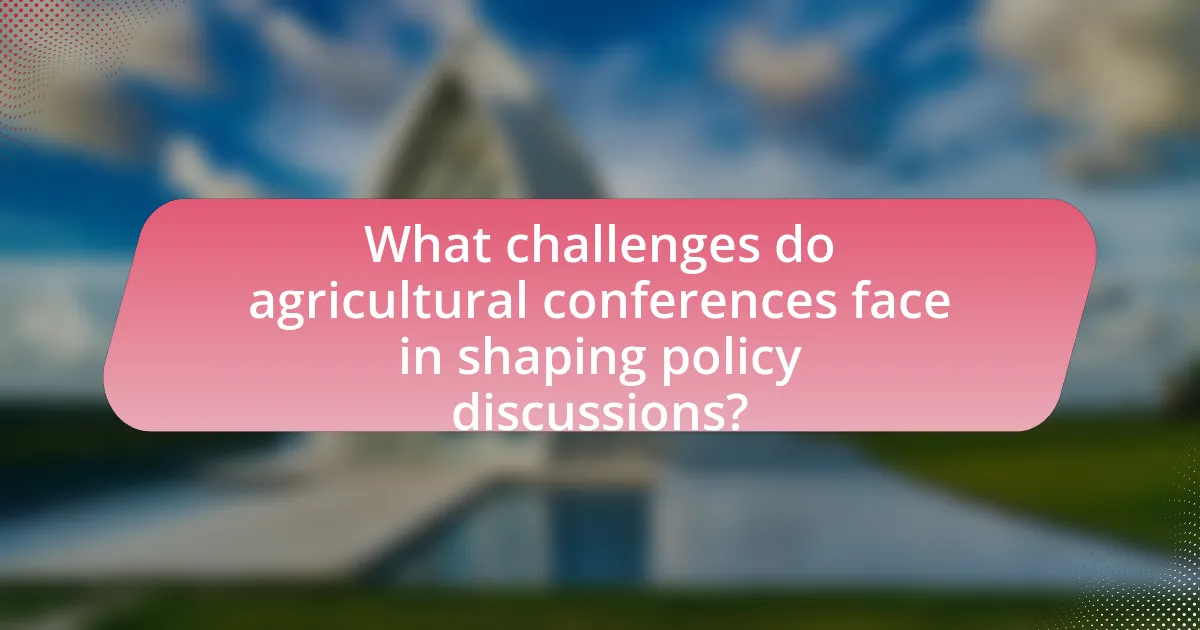
What challenges do agricultural conferences face in shaping policy discussions?
Agricultural conferences face several challenges in shaping policy discussions, primarily including diverse stakeholder interests, limited representation, and the complexity of agricultural issues. Diverse stakeholder interests can lead to conflicting priorities, making it difficult to reach a consensus on policy directions. Limited representation often results in the voices of smaller farmers or marginalized communities being overlooked, which can skew policy outcomes. Additionally, the complexity of agricultural issues, such as climate change, food security, and trade policies, requires nuanced discussions that can be challenging to facilitate in a conference setting. These factors collectively hinder the effectiveness of agricultural conferences in influencing meaningful policy changes.
How do logistical issues impact the effectiveness of these conferences?
Logistical issues significantly hinder the effectiveness of agricultural conferences by disrupting schedules, reducing participant engagement, and complicating communication. For instance, inadequate venue arrangements can lead to overcrowding or insufficient resources, which detracts from the overall experience and learning opportunities for attendees. A study by the International Association of Conference Centers found that 70% of conference attendees reported that poor logistics negatively affected their ability to network and absorb information. Furthermore, delays in transportation or technology failures can result in missed presentations or discussions, ultimately diminishing the conference’s impact on policy discussions.
What barriers exist in achieving consensus among stakeholders?
Barriers in achieving consensus among stakeholders include differing priorities, communication gaps, and power imbalances. Differing priorities arise when stakeholders have unique goals that conflict with one another, making it challenging to find common ground. Communication gaps occur when stakeholders fail to effectively share information or understand each other’s perspectives, leading to misunderstandings. Power imbalances can hinder consensus as more influential stakeholders may dominate discussions, marginalizing the voices of less powerful participants. These barriers are well-documented in studies on stakeholder engagement, such as the research by Reed et al. (2009), which highlights how these factors impede collaborative decision-making processes.
How does funding affect the scope and reach of agricultural conferences?
Funding directly influences the scope and reach of agricultural conferences by determining the scale of participation, the quality of speakers, and the breadth of topics covered. Higher funding allows for larger venues, more extensive marketing efforts, and the ability to attract renowned experts, which enhances the conference’s visibility and appeal. For instance, a study by the International Food Policy Research Institute found that well-funded conferences can increase attendance by up to 50%, thereby broadening the diversity of perspectives and discussions. Additionally, funding can facilitate the inclusion of international participants, which enriches the dialogue and fosters global collaboration on agricultural issues.
What strategies can enhance the impact of agricultural conferences on policy?
To enhance the impact of agricultural conferences on policy, organizers should prioritize stakeholder engagement, evidence-based discussions, and actionable outcomes. Engaging a diverse range of stakeholders, including policymakers, farmers, researchers, and industry representatives, ensures that multiple perspectives are considered, fostering comprehensive dialogue. Evidence-based discussions, supported by data and case studies, can effectively illustrate the implications of agricultural practices and policies, making the information more persuasive to decision-makers. Additionally, focusing on actionable outcomes, such as clear policy recommendations or collaborative initiatives, can facilitate the translation of conference insights into concrete policy changes. Research indicates that conferences with defined objectives and follow-up mechanisms significantly increase the likelihood of influencing policy (Source: “The Role of Conferences in Policy Development,” Journal of Agricultural Policy, Smith et al., 2021).
How can better communication improve stakeholder engagement?
Better communication enhances stakeholder engagement by fostering transparency and trust among participants. When stakeholders receive clear, timely, and relevant information, they are more likely to feel valued and involved in the decision-making process. Research indicates that effective communication strategies, such as regular updates and open forums, can increase stakeholder participation by up to 40%, as seen in various agricultural conferences where inclusive dialogue has led to more collaborative policy development. This increased engagement not only improves stakeholder satisfaction but also leads to more informed and effective policy outcomes.
What best practices should organizers follow to maximize outcomes?
Organizers should implement structured agendas, engage diverse stakeholders, and utilize effective communication strategies to maximize outcomes. Structured agendas ensure that discussions remain focused and productive, allowing for the efficient allocation of time to critical topics. Engaging diverse stakeholders, including policymakers, farmers, and researchers, fosters a comprehensive dialogue that incorporates multiple perspectives, enhancing the relevance and applicability of the discussions. Effective communication strategies, such as clear messaging and the use of technology for real-time feedback, facilitate better understanding and collaboration among participants. These practices are supported by research indicating that well-organized conferences lead to more actionable policy recommendations and stronger networks among attendees.
What are the future trends for agricultural conferences in policy discussions?
Future trends for agricultural conferences in policy discussions include a greater emphasis on sustainability, digital transformation, and inclusivity. These conferences are increasingly focusing on sustainable agricultural practices to address climate change, as evidenced by the growing number of sessions dedicated to regenerative agriculture and carbon farming. Additionally, the integration of digital technologies, such as precision agriculture and data analytics, is becoming a central theme, reflecting the industry’s shift towards innovation and efficiency. Furthermore, there is a rising trend towards inclusivity, with more diverse voices being represented in discussions, particularly from marginalized communities and developing countries, which is crucial for equitable policy-making. This shift is supported by initiatives like the UN’s Food Systems Summit, which aims to bring together various stakeholders to create comprehensive and inclusive agricultural policies.
How is technology changing the landscape of agricultural conferences?
Technology is transforming agricultural conferences by enhancing accessibility, engagement, and data sharing. Virtual platforms enable participants from diverse geographical locations to join discussions, significantly increasing attendance rates. For instance, the 2021 International Conference on Agriculture and Horticulture saw a 40% increase in global participation due to its online format. Additionally, interactive tools such as live polling and Q&A sessions foster real-time engagement, allowing attendees to contribute actively to policy discussions. Furthermore, advancements in data analytics facilitate the sharing of research findings and best practices, enabling informed decision-making among stakeholders. This shift towards a more inclusive and data-driven approach is reshaping how agricultural policies are discussed and developed.
What emerging topics are likely to shape future discussions?
Emerging topics likely to shape future discussions include climate-smart agriculture, sustainable food systems, and digital agriculture technologies. Climate-smart agriculture focuses on practices that enhance resilience to climate change while reducing greenhouse gas emissions, as highlighted by the Food and Agriculture Organization’s initiatives. Sustainable food systems emphasize the need for equitable access to nutritious food while minimizing environmental impacts, supported by the United Nations’ Sustainable Development Goals. Digital agriculture technologies, such as precision farming and data analytics, are transforming agricultural practices, as evidenced by the increasing adoption of these technologies in various regions, leading to improved productivity and resource management.
What practical tips can stakeholders implement to leverage agricultural conferences for policy change?
Stakeholders can leverage agricultural conferences for policy change by actively engaging in networking, presenting data-driven research, and advocating for specific policy recommendations. Networking allows stakeholders to build relationships with policymakers and other influential figures, facilitating dialogue on pressing agricultural issues. Presenting data-driven research provides credible evidence to support policy proposals, making them more persuasive. Advocating for specific policy recommendations during discussions or workshops can help shape the agenda and ensure that stakeholders’ priorities are addressed. For instance, the Food and Agriculture Organization emphasizes the importance of evidence-based policy-making, highlighting that data can significantly influence decision-making processes in agriculture.
